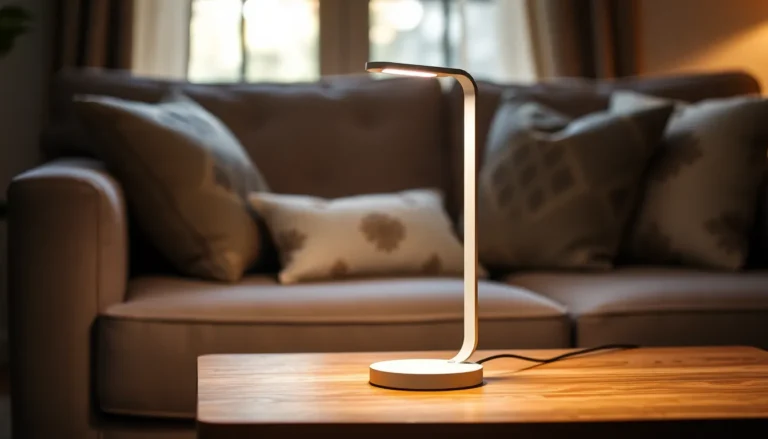Science isn’t just for lab coats and serious faces; it’s a world of wonder waiting to be explored, especially by kids. Imagine a kitchen turned laboratory where baking soda volcanoes erupt and homemade slime stretches into infinity. These science projects for kids aren’t just fun; they spark curiosity and ignite a passion for discovery.
Table of Contents
ToggleBenefits Of Science Projects For Kids
Science projects provide numerous advantages for children. Engaging in these activities promotes hands-on learning and transforms standard environments into spaces for discovery.
Encourages Curiosity
Children explore the world around them through science projects. Sparked by experiments, they ask questions and seek answers. Inquisitiveness grows as they witness science in action. Curiosity leads to deeper understanding and a desire to learn more. Activities, like observing chemical reactions, captivate young minds and stimulate their imagination. When kids participate in practical projects, they become excited about science.
Enhances Critical Thinking Skills
Science projects boost critical thinking abilities in kids. Problem-solving starts from identifying challenges within experiments. As children analyze data, they develop strategies to formulate conclusions. They learn to evaluate outcomes and refine their hypotheses. This process encourages not only logical reasoning but also adaptability when results differ from expectations. Engaging with science teaches kids how to think independently and embrace a systematic approach to learning.
Types Of Science Projects For Kids


Science projects come in various forms, each fostering different skills and interests in children. Engaging in diverse science activities offers children unique learning experiences.
Simple Experiments
Simple experiments are perfect for young scientists, requiring minimal materials and steps. Children can create a baking soda volcano using baking soda, vinegar, and food coloring for an explosive reaction. Another fun activity involves growing crystals with sugar and water, allowing for observation of chemical changes. These experiments help kids understand scientific concepts while providing instant gratification.
DIY Science Kits
DIY science kits cater to curious minds, offering structured learning experiences through hands-on activities. Many kits include materials and instructions for projects like building a solar system model or creating circuit boards. Kits often cover topics such as chemistry, physics, or biology, enhancing knowledge while sustaining interest. Exploring these kits encourages kids to dive deeper into scientific principles and challenges them to think creatively.
Outdoor Science Activities
Outdoor science activities allow children to explore nature while learning. They can observe plant growth, collect leaves, or even study insect behavior. Conducting experiments like testing soil pH with household items sends kids outside to interact with their environment. These activities promote curiosity about ecosystems and natural phenomena, providing enriching experiences. Engaging with nature enhances learning and encourages children to appreciate the world around them.
Tips For Successful Science Projects
Successful science projects require careful planning and attention to detail. Consider the following key tips for an engaging experience.
Safety Precautions
Before starting any experiment, prioritize safety measures. Always use protective gear like goggles and gloves to safeguard against accidents. Select age-appropriate projects for children and ensure adult supervision during potentially hazardous activities. Read all instructions thoroughly to prevent injuries and use safe materials. Store chemicals and tools in safe, designated areas. Discuss the importance of safety guidelines with kids to instill a sense of responsibility and awareness.
Using Everyday Materials
Utilizing everyday materials enhances creativity in science projects. Items like baking soda, vinegar, and food coloring often serve as excellent ingredients for experiments. Encourage kids to recycle items, such as plastic bottles or cardboard, to create innovative projects. Many household products are accessible and inexpensive, making science experiments enjoyable without significant costs. Exploring common materials encourages children to think outside the box and helps them discover the science around them.
Engaging Kids In Science
Engaging kids in science turns learning into a captivating adventure. Hands-on projects capture their attention, making complex concepts easily understandable.
Making It Fun
Crafting enjoyable science experiments stimulates curiosity in children. Projects like colorful vinegar and baking soda reactions create excitement. Simple activities, such as building a homemade lava lamp with oil and water, invite children to explore scientific principles while having fun. Incorporating challenges, like constructing a bridge from spaghetti, encourages innovation and teamwork. Celebrating small successes keeps motivation high, making science enjoyable. Ultimately, integrating play into learning fosters a deeper interest in scientific exploration.
Integrating Technology
Using technology enhances the learning experience for young scientists. Educational apps introduce interactive experiments, allowing kids to conduct virtual simulations. Platforms like YouTube provide step-by-step guides for various projects, making it easy for kids to follow along. Online resources, such as science blogs and websites, offer inspiration and new ideas to explore. Virtual reality experiences immerse children in scientific concepts, igniting their imagination. Integrating technology not only enriches traditional projects but also keeps kids engaged in a tech-savvy world.
Engaging kids in science projects not only sparks their curiosity but also nurtures essential skills for the future. By transforming everyday environments into vibrant learning spaces, children can explore the wonders of science through hands-on activities. Whether it’s creating a baking soda volcano or embarking on outdoor experiments, these projects promote critical thinking and problem-solving.
Incorporating technology and celebrating small achievements can further enhance the learning experience. As children dive into these captivating adventures, they develop a profound appreciation for science and its role in their lives. With the right approach, science becomes not just a subject but a thrilling journey of discovery that inspires young minds to explore the world around them.






